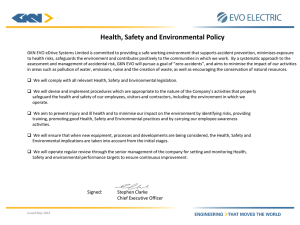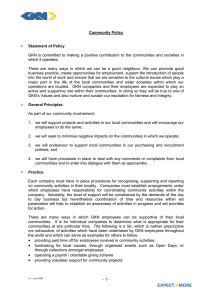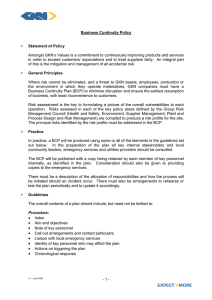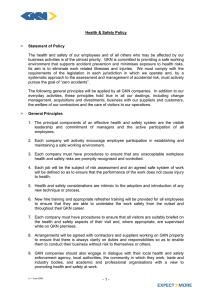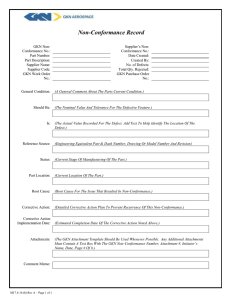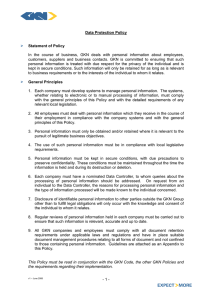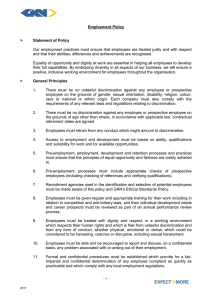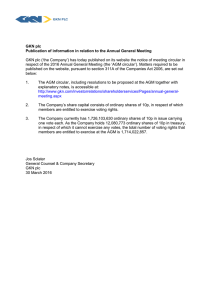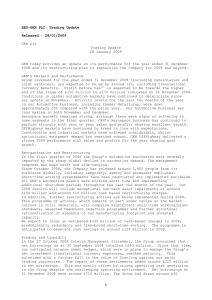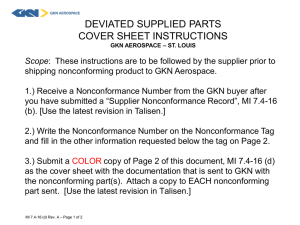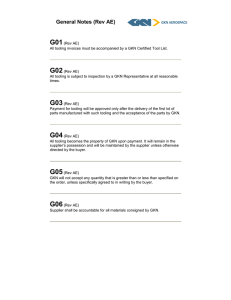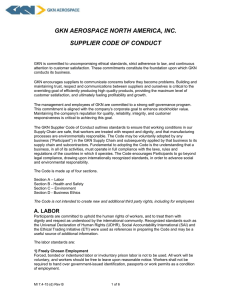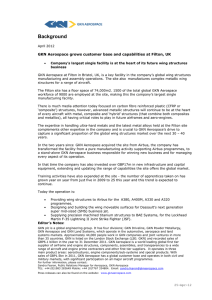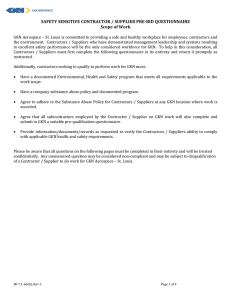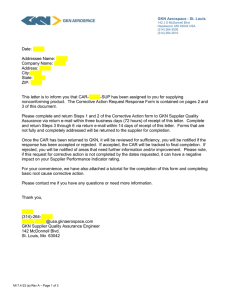Document 10713189
advertisement
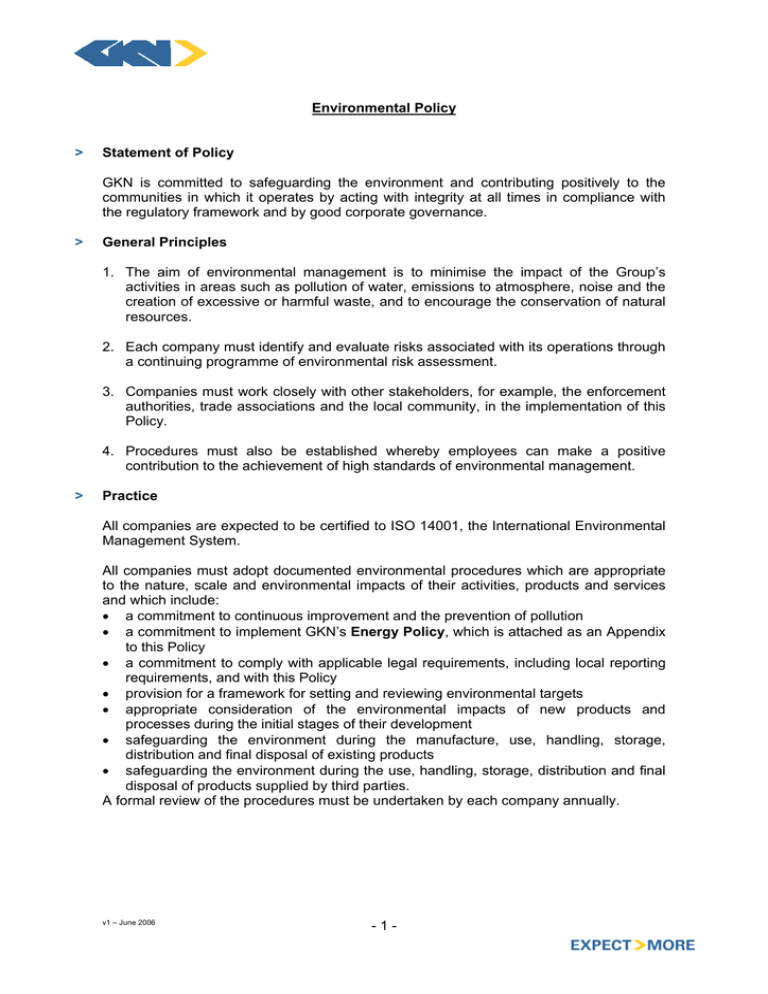
Environmental Policy > Statement of Policy GKN is committed to safeguarding the environment and contributing positively to the communities in which it operates by acting with integrity at all times in compliance with the regulatory framework and by good corporate governance. > General Principles 1. The aim of environmental management is to minimise the impact of the Group’s activities in areas such as pollution of water, emissions to atmosphere, noise and the creation of excessive or harmful waste, and to encourage the conservation of natural resources. 2. Each company must identify and evaluate risks associated with its operations through a continuing programme of environmental risk assessment. 3. Companies must work closely with other stakeholders, for example, the enforcement authorities, trade associations and the local community, in the implementation of this Policy. 4. Procedures must also be established whereby employees can make a positive contribution to the achievement of high standards of environmental management. > Practice All companies are expected to be certified to ISO 14001, the International Environmental Management System. All companies must adopt documented environmental procedures which are appropriate to the nature, scale and environmental impacts of their activities, products and services and which include: • a commitment to continuous improvement and the prevention of pollution • a commitment to implement GKN’s Energy Policy, which is attached as an Appendix to this Policy • a commitment to comply with applicable legal requirements, including local reporting requirements, and with this Policy • provision for a framework for setting and reviewing environmental targets • appropriate consideration of the environmental impacts of new products and processes during the initial stages of their development • safeguarding the environment during the manufacture, use, handling, storage, distribution and final disposal of existing products • safeguarding the environment during the use, handling, storage, distribution and final disposal of products supplied by third parties. A formal review of the procedures must be undertaken by each company annually. v1 – June 2006 -1- All companies must put in place a formal system, which will be capable of generating accurate data, for the collection of the following environmental data: • energy consumption • the generation of waste • the consumption of water • the emission of carbon dioxide from the use of energy. > Guidelines From time to time the Group may produce guidelines on environmental management matters. Such guidelines will be incorporated into the GKN Group Environmental Manual. Although these guidelines will not be mandatory, the arrangements in a company should ensure that any alternative procedures which are implemented will achieve equivalent results. > Measures and Metrics Companies shall, wherever possible, refer environmental data to metrics agreed at Divisional level, in order to enable valid year on year comparisons to be made taking into account year on year changes in production. Typically the measure of production shall be the weight of product produced in the relevant year. Where this is inappropriate another appropriate measure must be found, failing which the sales value should be used. Where possible companies must benchmark with other Group companies with similar production patterns in order to establish and share best practice. Where appropriate, companies may develop their own additional metrics to enable internal year on year comparisons to be made. > Assurance Companies must set up internal review procedures, in accordance with the requirements of ISO 14001, to provide assurance that their internal environmental management system is operating as intended and that all environmental data collected is accurate and reliable. Companies must require external organisations certifying compliance with ISO 14001 to include compliance with this Policy as part of their audit. This Policy must be read in conjunction with the GKN Code, any written guidelines, the other GKN Policies and the requirements regarding their implementation. v1 – June 2006 -2- Appendix to Environmental Policy Energy Policy As part of our stated principles for delivering outstanding products and services to our customers, for maintaining the well being of our employees and for delivering superior returns to our shareholders, GKN is committed to long-term sustainability. Optimising the Group’s consumption of energy is an essential element of this. Our Policy is: 1. to improve progressively energy efficiency at all levels in the Group; 2. to have clearly defined energy management roles, responsibilities and plans within an environmental management systems (EMS) framework based on the ISO 14001 standard; 3. to set achievable targets for reducing energy consumption per unit of production in all our operations; 4. to purchase energy at the most competitive rates, to leverage energy purchases across the Group to obtain maximum commitment from suppliers and to develop supply side hedging strategies to minimise exposure to market fluctuations; 5. to ensure that energy consumption is taken into account when specifying new plant and equipment and that significant consumers of energy have energy meters with an output compatible with modern energy management systems; 6. to ensure that energy efficiency receives adequate resources and investment in order to meet the Policy objectives and targets; 7. to include energy awareness and management in employee training programmes; 8. to minimise the environmental impact of our energy consumption by exploring ways of using low carbon technologies, by maximising the use of renewable energy sources where economically feasible, by seeking to reduce progressively emissions of carbon dioxide relative to production and by abiding by international agreements and protocols; 9. to communicate the achievements with external bodies and stakeholders; and 10. to influence our supply chain to pursue improvements in energy efficiency and to adopt low carbon technology. As a broad strategy for achieving these Policy objectives, we will continually monitor and review our performance in energy management and target achievements throughout all our operations. v1 – June 2006 -3-
